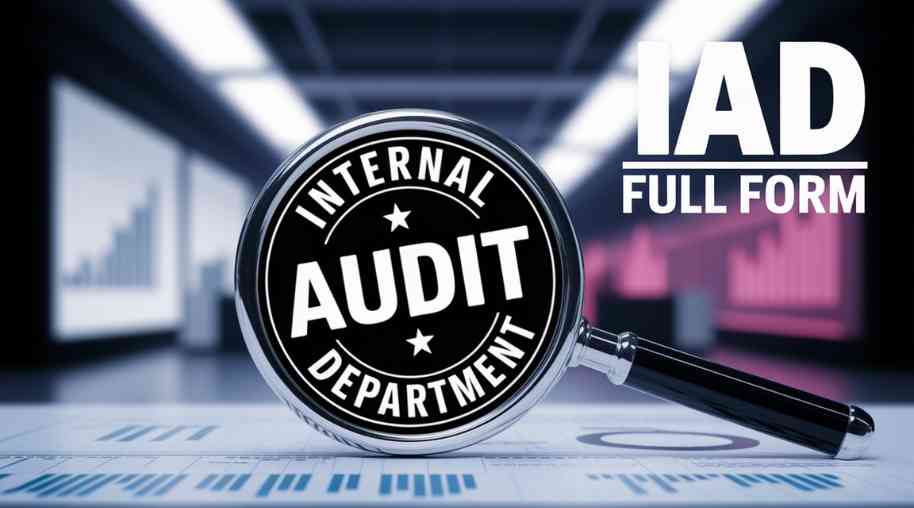IAD Full Form-Internal Audit Department
by Shashi Gaherwar
0 4480
Internal Audit Department: Functions, Importance, and Best Practices
The Internal Audit Department plays a critical role in ensuring an organization’s financial integrity, operational efficiency, and compliance with laws and regulations. By conducting systematic evaluations, internal auditors help businesses identify risks, improve processes, and prevent fraud. This article explores the functions, importance, challenges, and best practices of the Internal Audit Department.

What is an Internal Audit Department?
An Internal Audit Department is an independent unit within an organization responsible for evaluating financial records, operational processes, internal controls, and regulatory compliance. It provides management with insights and recommendations to enhance business performance and safeguard assets.
Functions of the Internal Audit Department
The primary functions of the Internal Audit Department include:
- Risk Assessment and Management
- Internal auditors identify and assess potential risks that may impact an organization’s financial health and operations.
- They recommend strategies to mitigate these risks and improve risk management frameworks.
- Ensuring Regulatory Compliance
- Organizations must comply with industry regulations, tax laws, and corporate governance standards.
- Internal auditors monitor adherence to legal and regulatory requirements to avoid penalties and reputational damage.
- Financial Audits
- The department reviews financial statements, accounting practices, and reporting processes to ensure accuracy and transparency.
- This helps detect errors, misstatements, or fraud in financial transactions.
- Operational Audits
- Operational audits assess business processes, supply chain management, and resource utilization.
- The goal is to improve efficiency, reduce waste, and optimize operations.
- Fraud Prevention and Detection
- Internal auditors investigate discrepancies in financial records, suspicious transactions, or unethical activities.
- Implementing fraud detection techniques helps minimize financial losses and legal risks.
- Internal Controls Evaluation
- Effective internal controls safeguard company assets and ensure compliance with policies.
- The audit department evaluates and strengthens these controls to prevent mismanagement or fraudulent activities.
- Corporate Governance Enhancement
- Strong corporate governance ensures ethical business practices, accountability, and transparency.
- Internal auditors provide recommendations to improve governance structures and decision-making processes.
Importance of the Internal Audit Department
- Protects Business Assets
- Internal audits help prevent financial losses by detecting fraud, operational inefficiencies, and mismanagement of resources.
- Enhances Financial Accuracy
- By verifying financial reports and transactions, internal audits ensure that stakeholders receive reliable and accurate financial information.
- Strengthens Risk Management
- Audit processes identify potential risks and provide actionable recommendations to mitigate them, ensuring business continuity.
- Ensures Regulatory Compliance
- Regular audits ensure that the organization meets industry regulations and legal requirements, reducing the risk of fines or legal issues.
- Improves Operational Efficiency
- By identifying bottlenecks and inefficiencies, internal auditors help businesses optimize processes and enhance productivity.
Challenges Faced by the Internal Audit Department
Despite its importance, internal auditing comes with challenges:
- Resistance from Employees
- Employees may perceive audits as intrusive or unnecessary, leading to resistance and non-cooperation.
- Keeping Up with Regulatory Changes
- Frequent changes in laws and industry regulations make it challenging for auditors to stay updated and ensure compliance.
- Cybersecurity Risks
- With increasing digital transformation, internal auditors must assess cybersecurity risks and data protection measures effectively.
- Limited Resources and Budget
- Some organizations may not allocate sufficient resources to the audit department, affecting its efficiency and ability to conduct thorough assessments.
Best Practices for an Effective Internal Audit Department
- Establish Independence and Objectivity
- The audit team should operate independently from management to ensure unbiased assessments and fair reporting.
- Use Data Analytics and Technology
- Advanced auditing tools and data analytics can improve fraud detection, risk assessment, and financial analysis.
- Maintain Strong Communication
- Auditors should collaborate with management and employees to foster a culture of transparency and cooperation.
- Continuous Training and Development
- Ongoing training for auditors ensures they stay updated on industry trends, regulatory changes, and new auditing techniques.
- Implement a Risk-Based Audit Approach
- Prioritizing high-risk areas in audit planning enhances efficiency and ensures critical issues are addressed promptly.
The Internal Audit Department is vital for maintaining financial integrity, regulatory compliance, and operational efficiency in organizations. By conducting risk assessments, financial audits, and fraud investigations, internal auditors provide valuable insights that drive business growth and sustainability. Adopting best practices such as using technology, continuous training, and maintaining independence will strengthen the effectiveness of internal audits and contribute to overall corporate success.
Further Learning Resources
If you’re passionate about building a successful blogging website, check out this helpful guide at Coding Tag – How to Start a Successful Blog. It offers practical steps and expert tips to kickstart your blogging journey!
For dedicated UPSC exam preparation, we highly recommend visiting www.iasmania.com. It offers well-structured resources, current affairs, and subject-wise notes tailored specifically for aspirants. Start your journey today!

Share:









Comments
Waiting for your comments